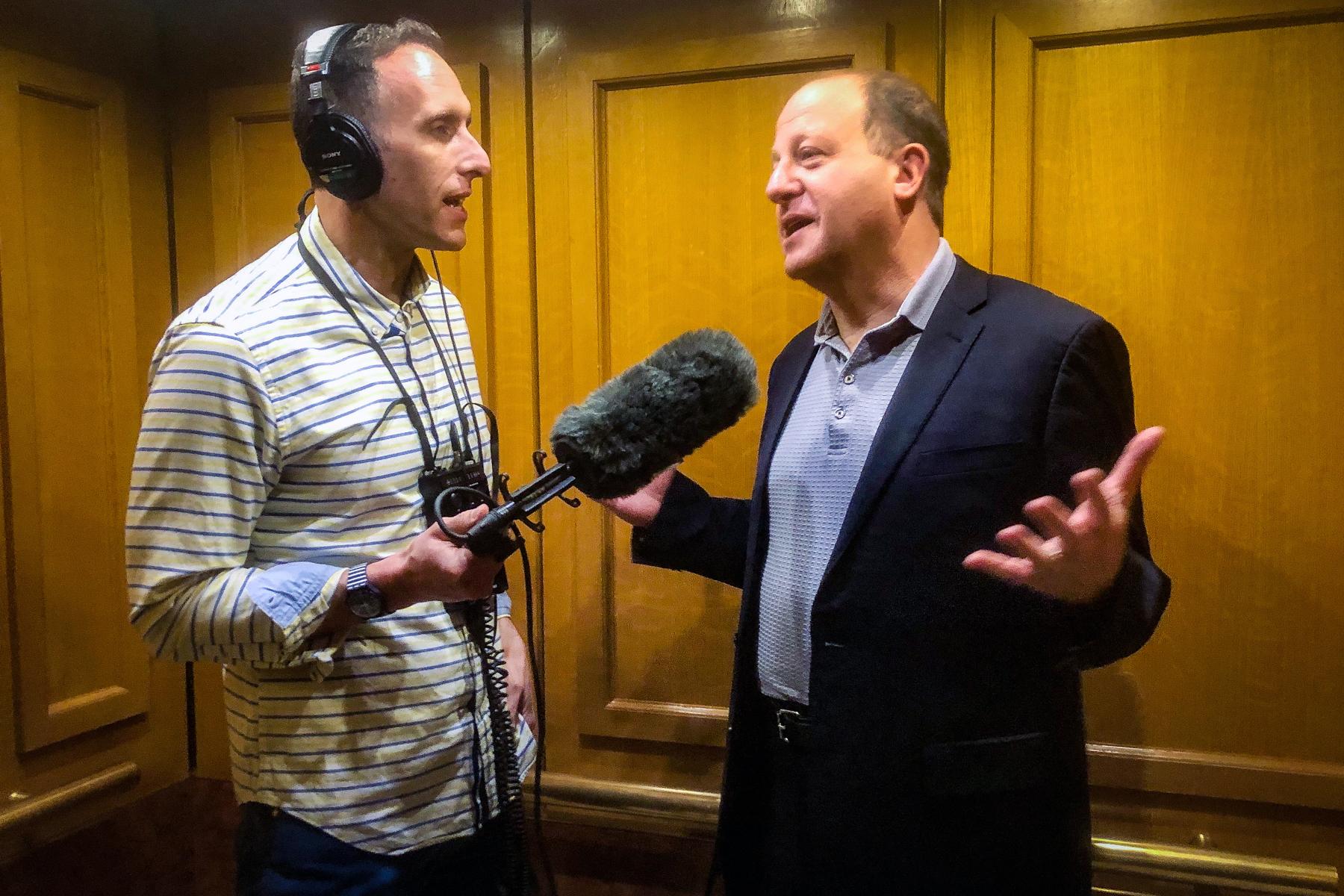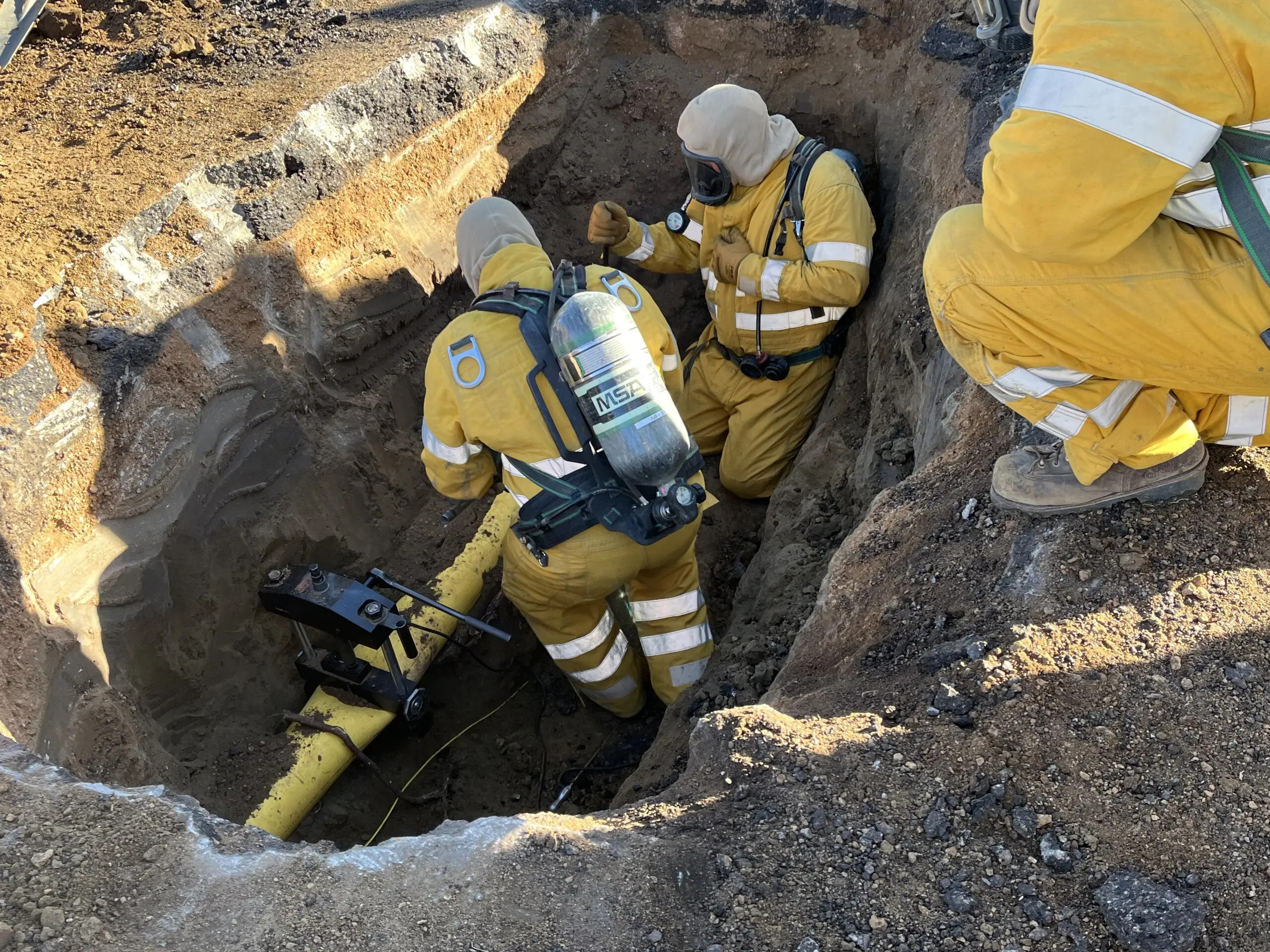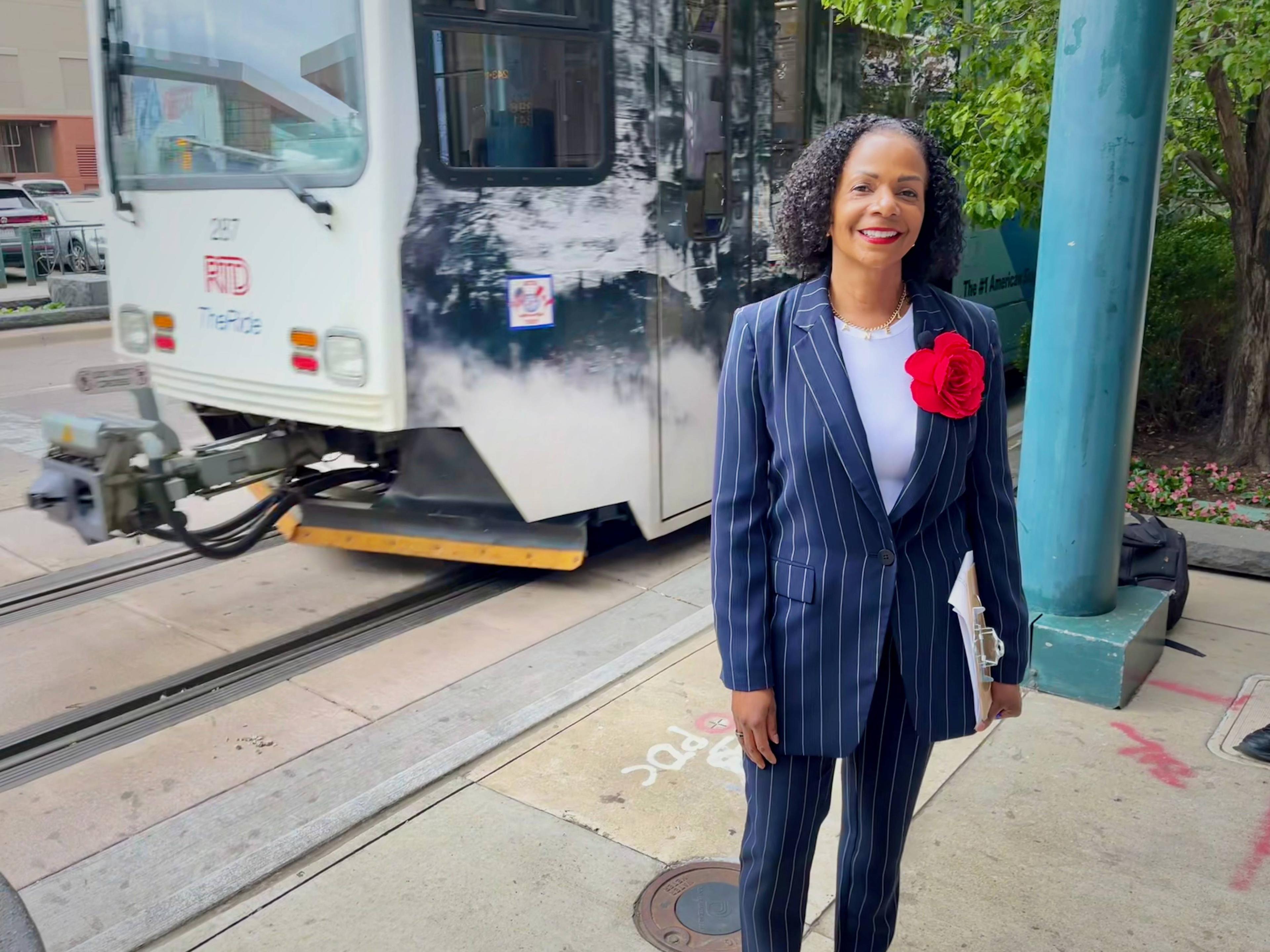
Updated 4:31 p.m.
With the 2023 legislative session in the books, Colorado Gov. Jared Polis is turning his attention to Proposition HH.
It’s a complicated measure designed to help lower property taxes in Colorado at a time when the typical homeowner could see 20 to 30 percent increases in their bills. As a part of the measure, Colorado would backfill the lost property tax revenue to local governments with money from the TABOR, or Taxpayer’s Bill of Rights, refund pool.
Colorado Matters host Ryan Warner spoke to Polis at the State Capitol Tuesday about the measure and other issues in Colorado.
The two met up in the basement of the Capitol, where Warner tasked the governor with pitching the November ballot measure to voters in as much time as it took to ride the elevator up three stories.
Interview Transcript
This interview has been edited for length and clarity.
Ryan Warner: Okay governor. I’m stepping in as the voter here … I run into you in an elevator … curious about that Proposition HH thing I’ve heard talked about … what’s your pitch before we step off and go our separate ways?
Gov. Jared Polis: I think it's the best chance Colorado voters have to significantly reduce your property tax rate. Home values have gone up the last few years. That's good if you happen to own a home. But unfortunately, the side effect is that your property taxes would also go up. What this bill will do is it'll take $50,000 off the value of every property for tax purposes. So, knock it down 50 grand, and it'll also reduce the (tax) rate. It has the added advantage of also reducing the rate for businesses across the state for commercial property tax to help make Colorado more competitive. More of that money should go into salaries, help attract new businesses to our state and finally create a mechanism to prevent these large property tax increases in the future called “truth in taxation,” which caps future increases at the rate of inflation and requires a vote by the jurisdiction — the fire district, the school district — if they want to go above that.
Warner: All right. At the round table in your office now, Governor, Prop HH would indeed reduce property tax rates but — because those values are rising so fast — tax bills will probably still go up. That said, there’s opposition to this measure, chiefly from a conservative group called the Advance Colorado Institute. Its president, Michael Fields, has this question for you:
Michael Fields: "Governor, in 2019, voters rejected Proposition CC, which would've ended TABOR tax refunds permanently. Last year, you made a big deal about sending $750 TABOR refund checks to every taxpayer. According to the nonpartisan Legislative Council, Prop HH would take as much as $10 billion in TABOR refunds over the next 10 years. So why do you support it when the legislature can fix this problem without touching TABOR at all?"
Polis: Because we have such a strong economy, we have a strong surplus, which is wonderful. And, so what Prop HH does is, it cuts property tax and it uses some of the surplus to backfill. Meaning, we're going to make sure that school budgets aren't slashed, that fire district budgets aren't slashed.
Remember the state doesn't get those property taxes, they go to your local district. So, that's the key thing people need to understand. If we were slashing money that came to the state, it would be easier in a sense — we just say we want less revenue, but we're not, it's library districts, it's fire districts, it's water districts, it's school districts. So, what we're saying is, ‘yes, we're gonna slash the property tax rate, but we're going to use some of the healthy surplus we have from the record strong economy to backfill some of that.’
Warner: Advance Colorado and several governments have sued to block this. So far, the courts have ruled in your favor. But I want to ask about the critique at the center of the lawsuit. Critics say this is not just a property tax measure — but that it takes aim at TABOR refunds as well. Some Democrats have argued for a long time that these refunds should go away forever. Is that part of the real agenda here?
Polis: Well, so far the courts have ruled in favor of simply allowing voters' choice. And that's what we're arguing: Do you want the choice to cut your property taxes and get rid of half the increase in your property tax as well?
What this initiative also does, which I think makes it more attractive to voters, is say, yes, we can cut property taxes, but voters — generally speaking — don't want to slash the budgets of your school districts, your library districts, your fire districts. So how do we do both? And the answer is: We have record surpluses. Let's use some of those surplus funds to make sure that we can reduce taxes and partially backfill many of those entities so they don't have to slash their budget in the services that they offer.
Warner: It is as if you are expressly avoiding the word TABOR when I ask you about it. Can you address that part of it?
Polis: Surplus is defined as the revenues above the TABOR limits. That is the surplus funds that the state has. It's the revenue above the TABOR limit. It's up to the people of Colorado how they use those funds in this initiative. Prop HH would say, ‘why don't we use part of those funds to make sure that, while we cut property taxes to save people money, we're not at the same time slashing school district and fire district budgets?’
Warner: Local governments can still voluntarily cut their own mill levies, or property tax rates. How many do you think will do that, and how do you know?
Polis: Colorado Mountain College has slashed their property tax increment. I would call on every public jurisdiction to reduce their property tax rate. This should not have to be the job of the state legislature. This should be the job of the taxing districts. Because they haven't acted, we took action and put this on the ballot to reduce the property tax rate. But, in addition, I also signed a bill that makes sure that if they do voluntarily slash their property tax rates that won't be held against them for TABOR purposes in the future.
Meaning, if we have a period of time where property values stagnate or go down and (districts) have to keep their revenue stable, they could float their rate back up. That was important. I hope that leads to more local jurisdictions voting to slash their property tax rates. Part of this initiative is the truth-in-taxation piece to Prop HH, which means that going forward, they can't automatically keep money above the rate of inflation. It's capped at the rate of inflation, and they have to proactively vote as a democratically elected board if they want to blow through that cap. And that makes it more likely they'll cut their rates in the future.
Warner: The ballot language is more than 50 words. The bill the legislature passed with the finer points is 48 pages. I asked you to make that elevator pitch earlier because this is really quite complex. How much time will you spend personally out on the trail promoting HH? What's the strategy?
Polis: The full text and summary will be in the Blue Book people get in the mail prior to the election — obviously the ballot summaries are the more concise version. The more people learn about it, I think the more there is to like. One example is this initiative makes the senior homestead tax exemption portable.
A senior homestead tax exemption knocks $200,000, for tax purposes, off the home for seniors who've lived in their home for, I think it's 20 years or more. But, in the past and up even through now, you lose that if a senior sells their home — downsizes to apartments. So you have this perverse incentive where if a senior chooses to downsize, they actually could pay more in property taxes. And for a senior on a fixed income, that's not an equation that works.
Many seniors are forced to stay in the houses that they raise their families in that are too large, even if they'd rather downsize, simply because their property always would go up. This makes it transferable, meaning you can take that tax advantage with you to your downsized apartment or home, freeing up your old home for a new family. And I think there’s a lot in this for people who want to make sure the property taxes don't increase more than we can afford to pay.
Editor's Note: Polis' description of the senior homestead exemption in Colorado is inaccurate. Under the rule, 50 percent of the first $200,000 of a home's value is exempted from property taxes. Additionally, a homeowner must have been in their residence for 10 years.
Warner: Prop HH exists to benefit homeowners, but I want to talk about renters because in years where there would be a TABOR surplus, their refunds would get hit too, but with very little benefits, something like $20 million total toward a tenant protection program. There are a lot of renters in this state. What's in it for them? Why would they reduce their TABOR surplus?
Polis: As a standard practice, landlords pass along expense increases, like rent increases, to their tenants. Very few landlords, out of the goodness of their hearts, simply absorb additional costs — those are passed along. I would add they're passed along, formally, in the lease for small businesses that have triple net leases, it's a direct pass-through to your local store and your local business. For residential, it's usually an indirect pass-through. When costs go up for the landlord very few of them absorb that. They generally pass that along to tenants and rents go up.
This will reduce the size of rent increases for Coloradans. Property taxes, in many places, still might go up and that's likely to be passed along to renters, but they won't go up nearly as much if Prop HH passes.
Warner: Without HH, the typical homeowner in Colorado indeed faces a 20, maybe 30 percent increase in taxes. Are values so high, governor, partly because it is so difficult to add housing stock in this state?
Polis: That's part of the equation. Prop HH would cut that property tax increase in half, which is a good first step. But, the underlying issue is that living in Colorado costs too much. That’s the fundamental issue.
No matter what relief you provide on the tax side, rents are high, and the average price to purchase a new home in the Denver metro area is over $600,000. Colorado Springs metro is over $480,000. Homeownership is becoming out of reach for too many Coloradans. And we really need to take action to change that to make sure that Colorado's a place where people can afford to live.
Warner: You sought to tackle housing affordability in this year's legislative session with a land-use package that ultimately failed, but the legislature did pass a bill giving cities the right of first refusal to buy apartment buildings to convert to affordable housing. That is a bill you vetoed. Why did that bill not fit into your vision?
Polis: Bills that further restrict the market generally increase the cost of rent, the cost of purchase. One part of our land-use package that did pass is a bill that prohibited growth caps and basically cities saying ‘no new housing in our city,’ which was driving up costs. That is now illegal in the state of Colorado. Cities can no longer ban housing. But, yes, we need to do more about ending exclusionary zoning, allowing homes to be built that people can afford, which are often duplexes, quadplexes, accessory dwelling units. These are the most affordable inventory and, very specifically, they're not allowed to be built in much of our state.
Warner: But on the right of first refusal?
Polis: This bill wasn't about new housing, it was about when certain units are sold. I think the units had to be built before a certain date and of a certain size, but basically old apartment buildings that, when they're sold, there would be delays that were introduced to that process that theoretically gives cities more of a chance to buy those apartments if they want them. But they can buy them now on the open market, which is the part that didn't make any sense to me.
I mean, if a property is listed, just as anybody can buy it, a city can buy it. The truth is most cities don't have all the money in the world to buy these units. What we really need, of course, is to end exclusionary zoning and allow more of the units that people can actually afford to live in to be built. Now, that includes apartments. And part of what we need to do on land use is to make sure that we have transit-oriented development with multi-family and apartments that can be built near transit so people can easily access bus or rail and not have to have a car unless they want one. And that adds the affordability aspect as well.
Warner: So you thought that this bill in particular was unnecessary?
Polis: More than unnecessary. It's counterproductive in the sense that when you add delays to buildings being purchased and sold, it can actually lead to preventing and providing a disincentive for the construction of new housing stock. This one only applied to old housing stock, but certainly, had it become law, people would've built in a risk factor in looking at new housing stock. ‘Hey, what if the state does the same thing in 10 or 20 years and makes it so I have all these difficulties ever selling this apartment building that I'm building.’
Warner: On the subject of vetoes, you also nixed a bill dealing with online ticket sales. Democratic State Sen. Robert Rodriguez said ‘I think the governor had a decision between local venues and ticket scalpers, and I think he went with ticket scalpers.’ Is that what happened?
Polis: I think that's obviously an incorrect characterization. This was opposed by every consumer group and my North Star is always, is it good for the general public? Consumers? Fans? This is for musical concerts, for sports events.
There's three main consumer advocacy groups. They all said, this is bad for consumers, restricts choice. There's good elements of the bill. I encourage Senator Rodriguez and others to work on the elements to help reduce fraud in this space, including deceptive URLs that can make people think they're getting a ticket from the original source when they're not. But the answer is not to put these major restrictions in place that only benefit big business and work to the detriment of fans and consumers.
Warner: One more bigger-picture question on vetoes. You had 10 of them this year. That's the most by any governor since 2006. Is there an ideological rift opening between you and your Democratic colleagues who dominate the legislature?
Polis: Well, we focus on quality of veto, not quantity. I'm certainly proud of each one that we had. Every bill that passes and there were 473 bills, me and my team review. We do a legal analysis, we do a policy analysis and make a decision about whether it's in the best interest of the state or not. Obviously, individual legislators represent different districts. They vote on things. I'm the sort of check for the general public. I represent the entire state of Colorado elected by the state of Colorado. I have to make the decision on balance, is this good or bad for the state. And we look at each bill individually, and I make that assessment to the best of my ability.
Warner: You’re a Democrat. The legislature is in Democratic hands. If you’re vetoing that number of bills is there a breakdown of communication? Is there a fundamental difference of opinion? What does it say with the communication that you’re having with another branch?
Polis: I think it's, it's actually a lower number of bills, for instance, than the Democratic House passed that die in the Democratic Senate or the Democratic Senate passes that die in the house. So there's three, you know, there's two legislative chambers and an executive that takes all of those to make a law reality. Just as the House is autonomous from the Senate, the governor's obviously autonomous. The other two bodies are composed of lots of folks, Democrat, Republican. I'm one person, but for a bill to become law, it needs to pass the Senate, the House, and it needs to be signed by the governor. I can also not act, it becomes law eventually.
Warner: I feel like I'm watching Schoolhouse Rock, Governor. So you don't think of this as a sign that there is perhaps a lack of communication or coordination or being on the same page with your fellow Democrats?
Polis: If it was like, 200 or 300 vetoes out of 473, that would be one thing. I think I saw that a Democratic governor of a state with a Republican state legislature vetoed over 100 bills. If it gets up to where we're vetoing hundreds of bills each session, that's one thing. But if it's 30 or 40 or 10, we're looking at each individual bill and some are good and some are bad and I sign the good ones. And I veto the bad ones.
Warner: I want to talk about gun violence and I'll acknowledge the mass shooting that took place early Tuesday morning in downtown Denver. The legislature passed a bill that has to do with school attacks. The law provides for bleed kits and stop-the-bleed training for schools. Is that a Band-Aid or a tourniquet on a much bigger issue?
Polis: I certainly support that law, but that's not the marquee public safety law that we passed this session. The biggest thing we did that I think will improve school safety is you have to be 21 to purchase a gun in Colorado now. So, 18-year-olds were able to legally purchase guns. Now it's age 21. It's always been 21 for pistols, but it was 18 for rifles. Now it's 21.
We also added a three-day waiting period for that purchase. We support making sure we have more medical assistance needed where we can, but I think these other measures will absolutely help reduce gun violence in the school settings.
Warner: We are bordered by many other states with looser gun laws. And for some folks in Colorado, that might be a 10-minute drive. How effective can a state-specific gun law be?
Polis: I think we need to do more, nationally. I think the lowest hanging fruit would be universal background check on all purchases, nationally, because you could be a convicted felon in Colorado, unable to buy a gun, you can go to an open-air gun show in Wyoming and you can purchase several weapons without a background check. It's better when we do these things together. There was a bipartisan gun violence package that President Biden signed that I supported. But I absolutely think they can do more, especially around universal background checks.
Warner: And so what is the effect of state-level laws if federal action is better? What are the state-level laws accomplishing?
Polis: Raising the age to 21 makes it a lot harder for an 18-year-old or 19-year-old to get their own gun. By the way, we didn't do anything that interferes with hunting with your parents. If you're 17 or 16 or 18, I mean, you can use their guns, no issue. This is about going into a store and saying, ‘I want a gun,’ and walking out with one.
It is now going to be much more difficult for an 18- or 19-year-old to do that. And, of course, there's many 18- or 19-year-olds that are in high school.
Warner: The state's largest city, where we sit now — Denver — has just elected a new mayor, Mike Johnston. He used to be a state senator in this building. Have you spoken with him since his victory?
Polis: I have. I've talked to Mike. I've known him for many years and he's a friend and I'm going to be getting together with him again shortly. I think the state is a very important partner with our major cities. I went to Mayor Yemi’s (Mobolade) inauguration in Colorado Springs and have met with him and look forward to working with all of our mayors in cities across Colorado and moving Colorado forward.
Warner: Did Johnston ask anything of you? Did you ask anything of him?
Polis: We identified some of the areas that he and his team will need to work on. Obviously, in Denver for instance, they are the frontline in addressing migrants from the southern border. And so he'll have to work on his strategy for that.
The state has some funding available around homelessness and we don't ourselves deploy that, we deploy it through cities and NGOs. And so we encourage Mike Johnston to really put together compelling proposals that the state could be a co-investor in, achieving his goal of ending homelessness in Denver — something that I strongly support and hope that he can accomplish and hope that we can help them accomplish.
Warner: Johnston will have some big responsibilities, usually that includes the announcement we hear on the DIA train, welcoming people to Denver. But, given that the Nuggets have won the NBA championship, should Nikola Jokić get to do the greeting?
Polis: Go Nuggets!
Being true to himself, it's something that he would probably reject the opportunity to do, but it would be nice to extend that to him.
What a great championship. The Monday night game was just amazing to watch, especially the final few minutes. I mean, just a suspense in the air. Absolutely incredible. It's an exciting time for Denver and for Colorado and for Nuggets fans everywhere.
Warner: Governor, thanks so much for being with us.
Polis: Thank you, Ryan.








